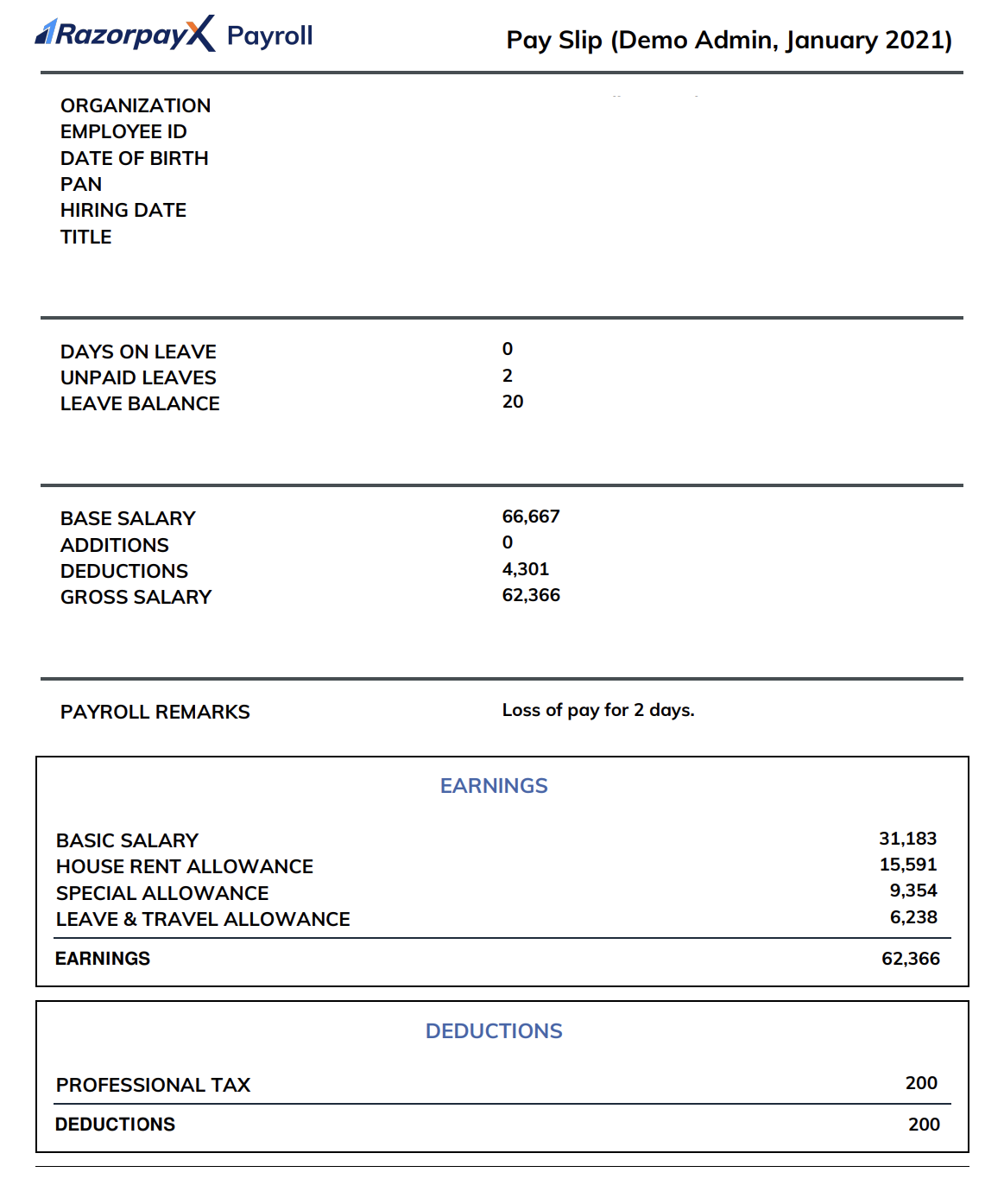What is gross salary
What is gross salary
Gross Salary
Enterprises met out salaries to their employees as a form of payment for their services. They are offered an aggregate compensation as their salary. However, there exists a difference between this gross salary and an employee’s take-home salary.
What is Gross Salary?
It signifies the amount paid out to an individual before any voluntary or mandatory deductions are made from it. Therefore, it is the total pay that an employee receives before taxes and other deductions. Gross salary includes income from all sources and is not confined to only the income received in cash.
Therefore, it also includes benefits or services received by an employee. On the other hand, the salary that an employee takes home is the net salary after deductions.
Gross Salary Components
The components of a gross salary include several benefits, some of which are elaborated below:
Components Excluded in Gross Salary
Following are the things that are not part of the gross salary paid to an employee:
Gross Salary Calculation
Gross salary is calculated by adding an employee’s basic salary and allowances prior to making deductions, including taxes. Here, a basic salary is the base income of an employee or the fixed part of one’s compensation package.
Gross salary calculation can be initiated with the help of this mathematical formula:
Gross salary = Basic salary + HRA + Other Allowances
For example, given below is the salary structure of an employee:
| Basic Salary | Rs. 20,000 |
| House Rent Allowance | Rs. 9,287 |
| Transport Allowance | Rs. 1200 |
| Provident Fund | Rs. 2500 |
| Statutory Bonus | Rs. 1650 |
| Income Tax | Rs. 2000 |
The gross salary can be calculated as below:
Gross salary = Basic Salary + HRA + Other Allowances
Gross salary = Rs. 20,000 + Rs. 9,287 + Rs. 1200 + Rs. 1650
Gross salary = Rs. 32,137
Provident Fund is not taken into account while deriving the gross salary. Additionally, as gross salary is given by the gross annual income before any deductions, it remains unaffected by the amount of income tax.
Difference between Gross Salary and Basic Salary
| Gross Salary | Basic Salary |
| It is the monthly or yearly salary paid to an employee without any tax deductions. | It is the salary paid to an employee before any fringe benefits are added to it. |
| Gross salary is inclusive of bonuses, overtime pay, allowances and other differentials. | Basic salary is the core of the salary received by an employee. |
Difference between Gross Salary and Net Salary
| Gross Salary | Net Salary |
| Gross salary is the amount received by an employee without any tax deductions. | Net salary is the amount that an individual receives after all deductions have been taken out. |
| Gross salary = Basic salary + HRA + Other allowances | Net salary = Gross salary – Income tax – Provident Fund – Professional tax |
Reporting Salary on Taxes
As per the Income Tax Act, 1961, there exist two kinds of taxes in India:
Therefore, an income tax is a direct tax levied by the government to an individual. The Income Tax Act levies taxes on multiple heads of income, one of which is income from salaries. It includes the taxable income that employees receive from their employers.
Income tax rates and slabs for FY 2021-22 are as below:
| Income tax slab | Rate of tax | Cess |
| Up to Rs. 2,50,000 | Nil | Nil |
| From Rs. 2,50,001 to Rs. 5,00,000 | 5% | 4% |
| From Rs. 5,00,0001 to Rs. 7,50,000 | 10% | 4% |
| From Rs. 7,50,0001 to RS. 10,00,000 | 15% | 4% |
| From Rs. 10,00,001 to Rs. 12,50,000 | 20% | 4% |
| From Rs. 12,50,001 to Rs. 15,00,000 | 25% | 4% |
| More than Rs. 15,00,001 | 30% | 4% |
Sections 80C and 80D are the most extensively used options for saving income taxes by salaried employees. Individuals who invest in stipulated tax-saving instruments can claim up to Rs. 1,50,000 for tax deductions.
Some of these tax-saving avenues under Section 80C are the following:
Understanding Gross Salary: What Is It And How It Works?
The total amount of money you earned while working at your job is referred to as your “gross salary,” and it is the amount of money you received before any deductions were made for things like taxes and health insurance.
If you have multiple jobs, you will have a gross pay for each one. Creditors frequently consider your gross earnings when deciding whether or not to grant you credit and, if so, how much they will give you.
“Gross salary” refers to the total amount of money you earned while working at your job. If you have multiple jobs, you will have a gross pay for each one. Creditors consider your gross earnings when deciding whether or not to grant you credit. Gross salary is determined by the employer when the job is offered. It doesn’t take into account deductions or taxes that are taken out after the payment is issued.
Gross salary serves as a measure to determine the employee’s payment capacity, to engage in any debt commitment.
Gross annual income is the amount of money a person earns in one year before taxes. Individual gross income includes wages, tips, dividends, alimony, pension, and interest.
After subtracting above-the-line tax deductions, the result is adjusted gross income (AGI). There are income sources that are not included in gross income for tax purposes but may still be included when calculating gross income.
You may notice two distinct amounts on your paycheck, depending on whether you earn a salary or hourly compensation. “Net pay” and “gross pay” are the terms used to describe these two figures. If you want to know how your pay compares to that of others in your area, use this Salary Calculator to get a free, customised pay range based on your region, industry, and experience.
The various terms used to explain wages can be perplexing.
This article explains the difference between gross and net pay and why it’s vital to know the difference.
Have you ever wondered why the term “gross” is applied to both salary and terrible sushi? We definitely did.
The explanation for this, it turns out, isn’t exactly as entertaining as we had thought. In truth, the word “gross” has several different meanings.
Many people think of the most popular definition, which is “glaringly noticeable usually because of unforgivable badness or objectionableness,” according to the dictionary. (We dare you to tell your spouse this when you don’t like their meal because it’s a pretty fantastic definition.)
However, there is another definition of gross, which is “an entire total, exclusive of deductions.” This is the meaning we’ll be concentrating on today.
The total amount of money you must disclose to the ATO is your gross income.
This figure includes the total of your combined salaries from all of the jobs you worked during the course of the year, in addition to any other income you received from a trust fund, rental income, dividends, or any other source. In other words, it includes all of the money you made, regardless of where it came from.
The resulting number is used to calculate your income tax, and then you remove all of your available tax deductions to arrive at your adjusted gross income, also known as the AGI. This is the amount on which you must pay taxes, and it is the amount on which some creditors, such as the Department of Housing and Urban Development, base their loan eligibility decisions.
What Is the Definition of Gross Salary?
When a job is offered, the company determines the gross wage.
This “gross compensation” can originate from a variety of sources, including wages, commissions, tips, bonuses, and any other economic incentive received as part of the wage, and it serves as the starting point for any calculations regarding income. Other forms of income can be calculated off of this “gross compensation.”
The term “gross salary” refers to the amount of money that was agreed upon prior to starting the job and was included in the job contract. This number does not take into account any deductions or taxes that are applied after the payment has been made.
The gross wage will ultimately be reduced as a result of these deductions in order to not only comply with any federal or state regulations, but also to pay for any additional financial commitments made by the employee that are deducted directly from its gross income.
The gross salary figure allows an employee to compare their pay to the market average to assess if their pay is competitive and rewarding in comparison to their industry peers.
Gross salary, on the other hand, is used to establish an employee’s payment capacity before committing to any debt.
Gross wages are the wages an employee earns before taxes and deductions are deducted. Because gross earnings are calculated before deductions, an employee’s real take-home pay could be much lower than their gross compensation. Depending on whether the employee works full-time or part-time, and whether the employee is salaried or hourly, gross pay are computed accordingly.
When calculating an employee’s gross pay, all of their remuneration is factored in before taxes and any other mandatory or voluntary deductions are made.
Tips, salaries, hourly earnings, overtime, vacation pay, piece-rate pay, commissions, bonuses, sick pay, and holiday pay are all included in gross wages. Base pay, such as a salary, hourly pay, or tips, often make up the majority of an employee’s gross compensation (for tip-based workers).
Employers can calculate gross salaries quarterly, monthly, weekly, or daily, or for any other time period they want.
Because gross wages are required to calculate the amount of taxes and deductions that must be withheld, it is imperative that you have a solid understanding of your employee’s gross pay. This is especially important in cases where deductions are calculated as a percentage of the employee’s gross income.
An individual’s gross income, often known as gross pay on a paycheck, is the total salary received from his or her employer before taxes or other deductions. This encompasses all forms of income, not just cash; it also includes property or services obtained. The amount of money a person gets in a year before taxes, including all sources of income, is referred to as gross annual income.
Knowing Your Gross Income
It is critical to comprehend the distinction between gross and net income. Knowing the difference between the two may help you plan your costs. Your paycheck may reflect a lesser take-home amount than what you expect from your salary or hourly earnings.
Lenders and landlords evaluate an individual’s gross income to decide if he or she is a creditworthy borrower or renter. Before removing deductions to calculate the amount of tax payable, gross income is the starting point when filing federal and state income taxes.
Individuals’ gross income on their tax returns includes not only earnings and salaries, but also other types of income like tips, capital gains, rental payments, dividends, alimony, pensions, and interest. Adjusted gross income is the outcome of deducting above-the-line tax deductions (AGI).
Below-the-line deductions are subtracted from AGI to arrive at a taxable income figure farther down the tax form. After taking advantage of any available deductions or exclusions, taxable income can be much lower than gross income.
Employee deductions and taxes are usually calculated based on gross earnings. Employers must be able to compute gross earnings correctly in order to determine statutory deductions, such as how much tax, Social Security, and Medicare must be deducted from an employee’s paycheck.
On their pay stub, which details not only their hourly compensation but also any deductions that may have been taken out, workers are able to view their annual gross pay for the period in question. Gross wages are typically recorded as the largest number near the top of the pay sheet.
A person’s gross income is their total earnings before taxes and other deductions. Salaries, earnings, bonuses, tips, and self-employment income are all examples of earned money.
There are several types of income that, for tax purposes, are excluded from the calculation of a person’s gross income, but which, depending on the circumstances, may be included in such a calculation. Non-taxable income includes things like some Social Security benefits and payouts, up to five life insurance payouts, certain inheritances or gifts, and interest on state or municipal bonds, among other things.
Business Gross Income
Before taxes and other expenses, gross business income is the amount your company makes from selling goods or services. Your gross income is the difference between your revenue and your cost of products sold (COGS).
Your gross income can be found on your company’s income statement. If your gross income isn’t indicated on the income statement, you can calculate it using the information on the income statement.
Gross income is also known as gross profit or gross margin.
Gross income, or gross profit margin, is the most basic statistic of a company’s profitability. While the direct cost of manufacturing or providing products and services is included in the gross income statistic, it excludes costs such as selling activities, administration, taxes, and other costs associated with running the total firm.
How Do You Calculate Gross Wages?
If you enter in your net pay for a specific pay period, the gross pay estimator will provide you with an estimate of your gross pay for that pay period. There are three possible time intervals for a pay period: weekly, fortnightly, or monthly. It can be utilised for the income years ranging from 2013–14 to 2020–21.
This calculator will assist you in determining an estimate of both your gross salary and the amount withheld from payments made to you in your capacity as a payee in situations such as the following:
It is not possible to compute the yearly income based on the amount received on a single pay period if the amount of your pay varies from period to period. This is because annual income is calculated based on the total amount received throughout the year. You will need to make use of the estimator to determine your gross pay for each pay period that you are unsure of, and then you will need to add up each of those individual amounts.
Whether or not an employee is paid on an hourly or a salary basis has an impact on how gross wages are computed. The number of hours that an hourly worker puts in is another factor that goes into determining their total wages.
Calculating Gross Pay for Hourly Workers
You have an additional obligation to include as part of the employee’s weekly gross salaries any overtime pay that they have received during the week.
On the other hand, the computations for overtime in certain other states are more specialised. Make sure you have a good understanding of how overtime is calculated in each state for your hourly workers.
Calculating Gross Pay for Salaried Workers
The gross pay of employees is determined in a basic method that does not require the use of complicated mathematical formulas or significant arithmetic abilities from the employee.
What Is the Distinction Between Net and Gross Salary?
The gross salary is the amount paid to an employee before taxes and deductions. After taxes and deductions, an employee’s net salary—or the pay they actually take home in their paycheck—is calculated. To determine an employee’s net pay, first determine gross pay, then remove any deductions from gross pay to determine the employee’s net wages (gross pay-deductions=net pay).
If you use the latter definition, you’ll get a better understanding of what gross wages or gross pay are.
Gross wages are the complete amount of money that is paid to an employee before any deductions are made for things like taxes, health insurance, and other withholdings that are required by payroll laws.
The term “net pay” refers to the amount of money that remains in an employee’s bank account after all deductions and withholdings have been taken out of their paycheck.
Employees’ net compensation will nearly always be less than their gross pay as a result of these deductions.
The amount of money that will eventually be accessible to you is known as net pay.
When it comes to your paycheck or pay statement, your “nett pay” will almost always be printed in a bigger font size than your “gross pay,” and it will also typically be bolded so that it stands out more than the former.
How Is Gross Pay Calculated?
You would do the following steps:
Both employers and employees need to understand the difference between gross and net pay.
Please do not hesitate to contact our team if you require payroll assistance. Eddy creates payroll solutions that are tailored to the demands of small businesses.
Conclusion
Common nontaxable income sources are certain Social Security benefits, five life insurance payouts, some inheritances or gifts, and state or municipal bond interest. Net salary is the pay an employee receives in their paycheck after taxes and deductions.
To calculate net pay, you must first calculate gross pay then subtract any deductions from gross pay.
Because of these deductions, an employee’s net pay will almost always be less than their gross salary.
Net pay is the amount that ends up in your bank account after taxes and other fees have been taken out.
The information on this page about gross salary is intended to be general in nature and is not personal financial or accounting advice.
About the Bookkept Authors —
Our team is composed of researchers, accountants, bookkeepers and tax specialists. We aim to provide the most accurate, up to date information about accounting, bookkeeping and tax law in Australia.
“What Is Gross Income for a Business?” Patriot Software, www.patriotsoftware.com, 5 June 2018, https://www.patriotsoftware.com/blog/accounting/gross-income/.
“Gross Pay: What Is It?” The Balance Small Business, www.thebalancesmb.com, 7 July 2020, https://www.thebalancesmb.com/what-is-gross-pay-and-how-is-it-calculated-398696.
About Bookkept
Bookkept are CPA qualified accountants and business advisors that provide quality professional accounting & business advisory to small & medium business clients. We take care of ATO issues, Xero/MYOB & payroll on the accounting side, and help with business process and systems to ensure you have the capacity to grow your revenue.
We serve the greater Melbourne area, and have locations in West Footscray & St Kilda.
Contact Us
Email: info [@] bookkept.com.au
Phone: (03) 8568 3606
Bookkeeping Services Melbourne
Xero Bookkeeping Specialists
We are a progressive firm of accountants who understand how to take the stress out of your business accounting and move you to the most advanced cloud-based accounting software available, Xero.
MYOB Bookkeeping Experts
100’s of local businesses using MYOB have been helped by our MYOB Certified Bookkeepers.
Accounting Services Melbourne
Your end of year tax returns & financials are an undervalued part of your tax year. We make sure your financials are completed on time & correctly, and we are able to do this because of the focus we put on your books. We’re a small team of Chartered Accountants focused on giving you peace of mind.
Gross Salary: All You Need To Know
Our careers play a crucial role in making us responsible individuals. For some people, a career or a job is just to pass time, for others it may be a decent source of income, and for a few, it’s life. Therefore, we see a large number of people joining the active workforce on a daily basis. Also, not to mention the excitement associated with your first job is always indefinable. But, to your surprise, the first salary you receive leaves you baffled, because the salary mentioned by the company was X rupees and you must have received less than the said amount. ‘Where’s the rest?’ is the most common question asked by a fresher.
However, not many know the subtle difference between take-home salaries, cost to company, and gross salary. Let us discuss one of these important elements i.e. Gross Salary in detail.
What is Gross Salary?
The employees who are paid for their services are offered gross salary as their CTC (cost to company). Cost to the company is the amount that the company will have to incur on an employee for a specific year. But, the point to remember here is that cost to the company is never equal to the amount of money one gets to take home.
In literal terms, Gross Salary is the monthly or yearly salary before any deductions are made from it.
A gross salary is a gratuity and EPF (employee provident fund) subtracted from the cost to the company. The components of Gross salary consists of the following:
House rent allowance
Leave travel allowance, etc.
Components that form a part of Gross salary are listed below:
Other components such as the salary arrears, remuneration or fee, overtime payment, and performance related cash awards.
Benefits like rent for accommodation, electricity, fuel charges, and water.
Allowances such as the travel allowance, medical allowance, leave travel allowance etc.
Let us look at some of the above components in detail
Basic Salary: Basic salary is the exact amount paid to an employee before any deductions are made or extra components are added to the salary. Besides, the basic salary is always lower than the gross salary or the take-home salary.
Perquisites : These are considerable amount of benefits received by an employee as a result of his/her position in an organization and are payable in addition to the salary received by them. Besides, these benefits can be taxable as well as non-taxable depending upon their nature.
Salary Arrears : Most of us are well versed with the term arrears. To define, arrears refers to an amount that is paid as a result of a hike or increment in your salary.
HRA (House rent allowance) : A House Rent Allowance is also one of the major salary components paid by the employer to their employees for accommodation expenses. Also, the HRA is applicable to both salaried and self- employed individuals.
Components that do not form a part of Gross Salary
There are few components that do not form a part of gross salary paid by the employer to an employee of his organization such as:
Refreshments and snacks provided by the employer to his employees during the office hours.
Reimbursement for travel and food expenses for official/business purposes
Gross Salary Simplified: Meaning, Components & Calculation
Employees’ salary is what you give your employees for the services provided by them. The amount paid is generally labelled as gross salary. But, do your employees know why there is a difference between the gross salary and what they get in hand?
In this article, we will clear the confusion that your employees might have about the term gross salary and the steps involved in its calculations.
What is gross salary?
Gross Salary is the total of all the components of the salary package offered to an employee. It indicates the earnings before any mandatory and voluntary deductions such as income tax, Provident Fund, medical insurance, etc.
You, as an employer, should provide a breakup of all the components that constitute the gross salary in monthly payslips. It may also include benefits received by the employee. The amount that an employee takes home after all such deductions is termed net salary.
Here’s what a monthly payslip should include.
Components of Gross Salary
These are the components that constitute gross salary:
Sum paid to an employee that does not include bonuses, benefits, perks, and incentives.
The sum is paid towards covering the housing expenses of an employee.
The employee’s share of the salary towards the Employment Provident Fund. It is 12% of the fixed components of the employees’ salary.
This component of the salary includes additional allowances offered by the company. This may include transport, conveyance, and outstation allowance, among others.
This may include an additional sum accruing from an increment in the salary of the employee.
Perquisites may include benefits offered over and above the basic salary. In most cases, these are monetary components. However, there could be non-monetary components also – paid as perquisites to employees in some companies.
An employee may receive an additional sum as a bonus in a year. This amount is linked to employees’ performance in the company.
How is gross salary calculated?
Gross salary includes the basic salary and allowances, before deductions like professional tax, TDS, provident fund, etc. The basic salary is the base income of the fixed component of the whole compensation offered to employees.
Gross Salary is, therefore: Basic Salary + HRA + Other Allowances.
What is the difference between Gross Salary and Basic Salary?
There are a few points of difference between gross salary and basic salary.
Gross salary is the monthly (or annual) salary paid to an employee without any tax deductions.
Basic salary is the salary paid to an employee before the addition of any benefits like allowances or perquisites.
Gross salary includes bonuses, overtime pay, allowances, and other perks.
Basic salary constitutes only the core amount received by the employee. Some of the calculations like HRA, PF deductions, are based on this basic amount.
What is the difference between gross salary and net salary?
While gross salary is the employee’s amount without any deductions, net salary is the amount received by the employee after all deductions have been accounted for.
Gross salary includes basic salary, HRA, and other allowances, whereas net salary is gross salary minus income tax, professional tax, and provident fund.
Why are manual payroll calculations complex?
As we can see, there are complex calculations involved in preparing payroll for a company’s employees, and it gets more intricate as the size of the company grows.
It is the most time-consuming task, as the HR department has to deal with several components and also make sure that errors do not creep in when calculating monthly gross and net salaries. When done manually, the margin for human error increases substantially for large companies. Also, tax laws are not simple and straightforward. The calculations have to take into account compliance with the changing tax rules and policies.
Payroll software systems – What every company needs
To make payroll calculations simple, quick, and error-free, companies are using advanced payroll software systems that can automate salary calculations and take care of payroll compliances.
Choosing the right automated payroll software is important to get the best value for your investment in this system, which is a must-have for all types of companies. RazorpayX Payroll is one of the most reliable and popular automated payroll software systems available today.
Why RazorpayX Payroll is the preferred choice?
Companies choose the RazorpayX Payroll as it is user-friendly, comprehensive, and designed to take care of all the payroll management elements in a company.
Makes the job of the HR team easy
With RazorpayX Payroll, the HR team can quickly update employee details on the system and provide employees access to their information. Employees can view it on the RazorpayX Payroll dashboard. Onboarding of new employees is done quickly, while it also minimizes inquiries and consultations with the other departments involved in payroll preparation.
With RazorpayX Payroll, the hassles associated with reconciliation and TDS deduction is minimized significantly. The finance managers only have to load the correct amount in the payroll account, and the system carries out the disbursals automatically when the software executes the payroll.
Has a short learning curve
RazorpayX Payroll takes the hassle out of getting acquainted with a new payroll system. While handling the other popular payroll systems may involve a long learning curve, that’s not the case with this software. It has an intuitive dashboard and a smooth & friendly interface designed to make the whole learning process simple and fast.
A boon for employees
The system is also a boon for employees who are often in the dark about payroll information and have to spend time with the relevant department and managers to get answers to their queries.
With RazorpayX Payroll, employees can get all the information and updates they need in one place. They can access their payslips in a few clicks and need not run from pillar to post for payroll related information.
RazorpayX Payroll USPs
RazorpayX Payroll is good for startups and small businesses as it offers the entire bouquet of payroll management solutions in one place at affordable pricing. The key features of the software are:
Now it’s time to automate your payroll with RazorpayX Payroll and spend your valuable time on accelerating business growth.
What’s the difference between gross pay and net pay?
Understand the difference between gross vs. net salary and learn what it means for your salary.
06 December 2021
Understanding the difference between gross pay and net pay is key to knowing how much money you’ll receive on pay day. It’s also important for understanding your taxes, and can help you budget for your monthly living expenses. Here, we’ll explain the key differences between gross vs. net salary and share how to calculate it. Let’s go!
What is gross pay vs. net pay?
Gross pay is the amount of money an employee receives from a company before any deductions—such as health insurance, taxes, or student loan payments—are taken out. When a job is advertised, the salary offered is usually listed as the gross pay. This is also sometimes known as your base salary, and excludes any short or long-term incentives or benefits. Net pay is the money left once taxes and deductions have been taken out of your gross pay. This is the amount that is paid into your bank account and constitutes your income.
If you’re a salaried employee, you will typically receive a breakdown of your salary each month on your payslip. Gross pay will usually be shown here—this is the higher figure and is often listed at the top of the slip. All taxes and deductions will typically be listed below it. Next to each of these items, you’ll see an amount of money, which is what will be deducted from your gross salary. The figure left after this is your net pay.
What is deducted from gross pay?
The deductions taken out of your gross pay can differ depending on what country you live in and the company you work for. However, here are some of the most common deductions you might spot on your payslip:
Remember that some of these are pre-tax deductions, which means the money is taken from your gross salary before the relevant taxes are applied—like retirement contributions or healthcare, for example. There are also post-tax deductions, which are sometimes taken from your net pay or after the taxes have been applied, such as union fees or charity donations.
How to calculate your gross income
This will depend on how you’re paid and whether you receive an annual salary or hourly pay. A salaried employee will be paid a fixed amount, usually divided over 12 months. If you’re being paid by the hour—also sometimes known as a wage employee—your payment will vary depending on the number of hours you work. So, let’s look at the different calculations for gross income.
How to calculate gross income if you’re a salaried employee
When you’re paid an annual salary, you’ll often see a recurring figure on every payslip, showing your gross pay for that month. Multiply your gross monthly income amount by 12 to find out your annual gross salary. Make sure you take into account any short or long-term bonuses you might receive to land at your total gross number.
How to calculate gross income if you’re a wage employee
As a wage employee who’s paid hourly, there are two ways to calculate your gross income. If you have monthly payslips for the previous year, simply add each month’s gross income together to find out your annual gross income.
It’s worth noting that this will be different if you’re trying to work out your future income. If you haven’t worked these hours yet—but you’ve agreed to regular working hours—you can work out your gross pay using this calculation:
Hourly pay rate x guaranteed weekly hours = weekly gross pay
You can then calculate your monthly pay by multiplying by four weeks, or annual gross pay by multiplying by 52—the number of weeks in a year. Make sure you deduct weeks you know you’ll be taking as vacation days.
How to calculate net pay from gross pay
Helpfully, all the information you need should be on your payslip, so make sure you look this over carefully before you start any complex math equations. Gross pay will typically be the top figure you see before any deductions have been made. Your net pay will then be the last number at the bottom of your payslip and should be consistent with the amount of money deposited in your bank account.
N26’s bank account can help you manage your salary better each month using the built-in Statistics feature. It automatically categorizes all your transactions and purchases, so you can keep track of your spending habits and see exactly where your money is going.





